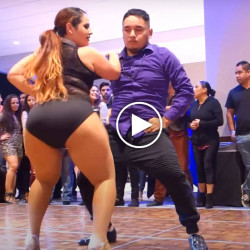El Salvador, a new migrant prison under the Trump administration
Human rights organizations warn against normalizing mass deportations without trial
Originally published on Global Voices
Collage illustrating a migrant in prison made by Global Voices on Canva Pro.
A three-minute video posted early Sunday morning, March 16, 2025, on the Twitter account of El Salvador's President Nayib Bukele showed a group of Latin American immigrants in the United States (all men), heads bowed and arms held by security agents, disembarking from planes arriving from the United States at El Salvador's Oscar Arnulfo Romero International Airport during the previous night.
Under US president Donald Trump's new immigration strategy, immigrants detained in the US were sent to the Centro de Confinamiento del Terrorismo (Terrorism Confinement Center, CECOT), El Salvador's controversial high-security mega-prison founded in 2023. In its short life, this prison has been the subject of complaints of human rights violations, torture, and lack of due process.
The US administration designated the deportees as terrorists for alleged connections to gangs like the “Tren de Aragua gang,” a criminal gang of Venezuelan origin with reported activity in Latin American countries since 2018. Hours later, Trump confirmed Bukele's video on his TruthSocial account.
The vast majority of those deported (238) are of Venezuelan nationality and allegedly belong, according to Trump, to the Tren de Aragua. On March 15, 2025, the Trump administration labeled the Tren de Aragua a “terrorist organization” through an executive order. Consequently, it was able to invoke the 1798 law Alien Enemies Act for their deportation to El Salvador. The Alien Enemies Act is a wartime law: it has its roots in a conflict between the United States and France, and the three times it has been used so far were all during declared wars.
US legal experts have long been skeptical of the Trump campaign and the Republican Party's promise to use the Alien Enemies Act in peacetime, as immigration has not historically constituted an invasion.
Immigration advocates are concerned that the law could lead to attacks on any immigrant, regardless of their criminal record. Boston-based immigration attorney Matt Cameron told The Nation:
Once the Trump administration normalizes the use of the Alien Enemies Act against the country’s purported enemies — and once the flouting of court orders comes to be seen as business as usual — it will almost certainly expand its use not just against suspected Venezuelan gang members but against ever-greater numbers of people from ever-greater numbers of countries. It’s a way to short-circuit any form of due process in the immigration system.
Neither Trump nor Bukele shared specific details that day about the names, ages, and criminal records of the 238 passengers who were deported, nor any information about contact with Venezuelan authorities (there have been no diplomatic relations between El Salvador and Venezuela since 2019). It was also revealed that the United States government will pay USD 6 million to its Salvadoran counterpart for one year of (renewable) custody of the deportees at the CECOT, which corresponds to USD 20,000 per person deported to the mega-prison.
The race for mass deportation
The flights already had a judicial imprint before their departure to Salvadoran soil: before the proclamation of the Executive Order, five Venezuelans represented by the American Civil Liberties Union (ACLU) and the Democracy Forward Foundation sued the Trump administration to prevent their “imminent deportation.”
US federal judge James Boasberg granted the plaintiffs a 14-day stay, and that same afternoon, following the proclamation of the Executive Order, he specifically blocked the application of the Alien Enemies Act. On March 24, Boasberg upheld the order preventing Trump from using war powers for deportations.
Despite the federal order, the flights departed for El Salvador with the group of 238 deportees targeted by Trump and Bukele. The statement by ICE (United States Immigration and Customs Enforcement) officials before Boasberg's court indicated that it was uncertain whether all the deportees belonged to the Aragua Train. According to the statement, many of them had no criminal records in the US:
While it is true that many of the TdA members removed under the AEA do not have criminal records in the United States, that is because they have only been in the United States for a short period of time.
The case is still under formal appeal and could end up before the US Supreme Court. The implications of the final decision go beyond this particular case, as they could have repercussions for immigration policy, civic spaces, and even constitute a constitutional crisis.
‘They are not from Tren de Aragua’
Reactions on social media from Venezuelan and international citizens and non-governmental organizations dedicated to the protection of migrants were swift. In the state of Aragua, located in central Venezuela, relatives of Francisco Javier García Casique recognized him among those detained in Bukele's video.
García Casique, a 24-year-old barber by trade, has no connection to the Tren de Aragua and no criminal record, according to statements made by his mother and brother to the Venezuelan news website El Estímulo. Since 2017, he was among the more than 7.8 million Venezuelan migrants estimated by the United Nations.
After an initial stay in Peru, he arrived in the United States in 2022 after crossing the Darien Gap (a dangerous natural pass between Colombia and Panama and a significant migration route in the Americas). He had a criminal record with ICE and a deportation order, which would have required him to return to his home country.
Identification by the families has revealed other names of those transferred to El Salvador, such as musician Arturo Suárez Trejo and soccer player Jerce Reyes Trejo. All statements so far categorically deny their relatives’ affiliation with the Tren de Aragua.
The Venezuelan NGO, the Venezuelan Program for Education-Action in Human Rights (PROVEA), immediately reiterated “migrants and refugees have rights”:
La administración Trump intensifica sus ataques contra los venezolanos, deportándolos a cárceles en El Salvador sin garantizar el debido proceso.
Siendo sometidos a un sistema carcelario señalado de abusos por la @CIDH, alejados de sus familias y sin garantías para su defensa.… pic.twitter.com/8amn6T6Je5
— PROVEA (@_Provea) March 16, 2025
The Trump administration is intensifying its attacks against Venezuelans, deporting them to prisons in El Salvador without guaranteeing due process.
They are subjected to a prison system flagged for abuse by the @IACHR, separated from their families, and without guarantees for their defense.…
From El Salvador, investigative journalist Carlos Martínez of El Faro called attention to his country's diaspora:
A la diáspora salvadoreña: Hay 101 personas en el CECOT que hicieron lo mismo que ustedes: entrar sin papeles a EEUU. ¿Ustedes se merecen ser tratados como terroristas en una cárcel extranjera? ¿A ustedes les parece bien que Bukele sea cómplice de eso? https://t.co/VsUw1GqUG5
— Carlos Martínez (@chelefaro) March 18, 2025
To the Salvadoran diaspora: There are 101 people in the CECOT who did the same thing you did: entered the US without papers. Do you deserve to be treated like terrorists in a foreign prison? Do you think it's okay for Bukele to be complicit in this?
Venezuelan journalist Ronna Rísquez, who has been researching and writing about the gang for more than a decade, explained on March 20 to the #DossierVenezuela podcast (directed by former Colombian vice president and journalist Francisco “Pacho” Santos):
Hay una exageración de alguna manera con lo que representa el Tren de Aragua. Efectivamente existe, puede haber personas que los representen en Estados Unidos y algunos delitos que involucraron a integrantes del Tren de Aragua según las autoridades estadounidense pero de allí no se conoce que sea algo masivo (…) lamentablemente se ha instrumentalizado el caso del Tren de Aragua para ejecutar medidas contra la migración venezolana que violan los derechos humanos.
There is a certain exaggeration regarding what the Tren de Aragua represents. It does exist. There may be people representing them in the United States, and some crimes have been committed by members of the Tren de Aragua, according to US authorities, but it is not known to be a massive operation there (…) Unfortunately, the Tren de Aragua case has been exploited to implement measures against Venezuelan migration that violate human rights.










